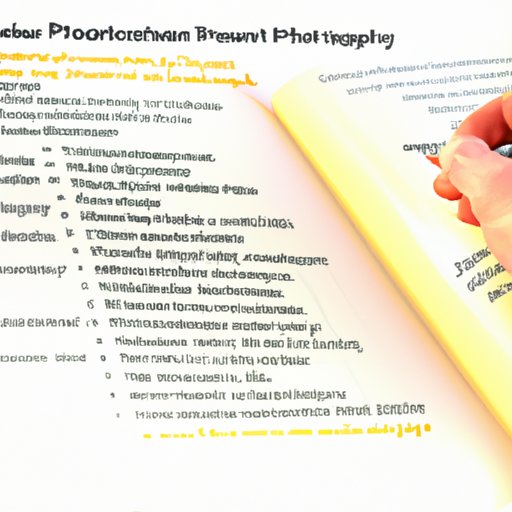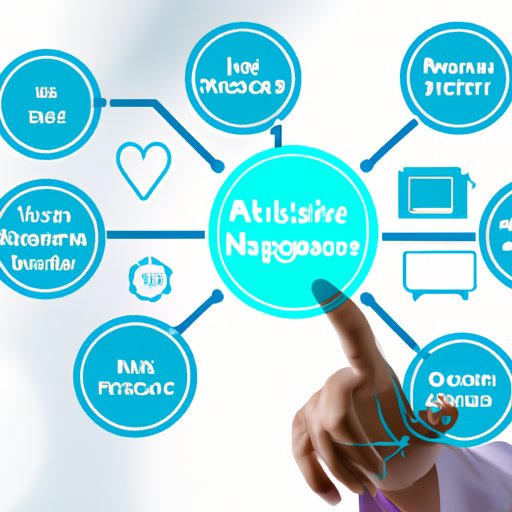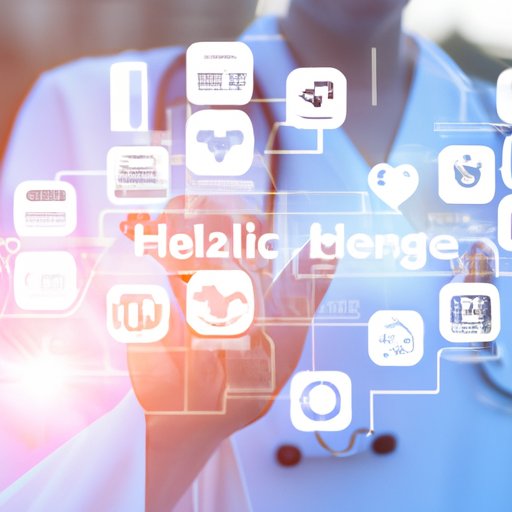Introduction
Healthcare management technology has become a critical component of modern healthcare systems. It includes a broad range of tools, software, and services that are used to manage medical records, improve patient care, and increase efficiency. This article provides an overview of healthcare management technology, its benefits, and how it can be used to improve patient outcomes and reduce costs.

Benefits of Healthcare Management Technology for Patients and Providers
Healthcare management technology offers a variety of benefits for both patients and providers. By leveraging technology, healthcare organizations can improve patient outcomes, increase efficiency, and save money.
Improved patient outcomes
The use of healthcare management technology has been shown to improve patient outcomes. According to a study published in the Journal of the American Medical Association, the use of electronic health records (EHRs) was associated with improved patient outcomes, including reduced mortality and readmission rates.
Increased efficiency
Healthcare management technology can also help increase efficiency in healthcare organizations. By streamlining processes and automating tasks, healthcare organizations can reduce costs and improve patient care. A study published in Health Affairs found that the use of EHRs improved efficiency, resulting in time savings of up to 20%.
Cost savings
In addition to improving patient outcomes and increasing efficiency, healthcare management technology can also help healthcare organizations save money. According to a study published in Health Services Research, the use of EHRs was associated with cost savings of up to 8%.
A Look at the Future of Healthcare Management Technology
As healthcare management technology continues to evolve, there are several emerging technologies that are poised to revolutionize the industry. Automation, artificial intelligence (AI), and data sharing are just some of the technologies that are expected to transform healthcare in the coming years.
Automation
Automation is one of the most promising technologies in healthcare. By automating routine tasks such as scheduling appointments and ordering tests, healthcare organizations can improve efficiency and reduce costs. According to a survey conducted by the American Hospital Association, more than half of hospitals are already using automation to streamline processes.
Artificial intelligence (AI)
AI is another technology that has the potential to revolutionize healthcare. AI-powered systems can analyze vast amounts of data to provide insights into patient care and make predictions about disease progression. According to a study published in the journal Nature Medicine, AI-based systems have the potential to improve diagnosis accuracy by up to 40%.
Data sharing
Data sharing is another key area of focus for healthcare organizations. By sharing data across healthcare organizations, providers can gain valuable insights into patient care and improve outcomes. According to a study published in the Journal of the American Medical Informatics Association, data sharing can reduce costs and improve patient outcomes by up to 30%.

Exploring the Different Types of Healthcare Management Technology
There are a variety of different types of healthcare management technology available. From electronic health records (EHRs) to clinical decision support systems and telemedicine, healthcare organizations have many options when it comes to managing patient data and improving patient care.
Electronic Health Records (EHRs)
EHRs are one of the most widely used healthcare management technologies. EHRs are digital records of patient information such as medical history, medications, test results, and more. EHRs allow healthcare providers to access patient information quickly and easily, improving patient care and reducing costs.
Clinical Decision Support Systems
Clinical decision support systems (CDSS) are computer-based systems that provide guidance to healthcare providers. CDSS can provide recommendations on diagnosis and treatment, helping providers make better decisions and improve patient care.
Telemedicine
Telemedicine is a type of healthcare management technology that allows providers to deliver care remotely. Telemedicine enables providers to diagnose and treat patients via video or phone consultations, eliminating the need for in-person visits. According to a study published in JAMA Network Open, telemedicine can improve access to care, reduce wait times, and improve patient satisfaction.
Population Health Management
Population health management is a type of healthcare management technology that is used to monitor and improve the health of populations. Population health management systems use data analytics to identify trends and patterns in patient data, helping healthcare providers understand the needs of their population and develop strategies to improve outcomes.
The Pros and Cons of Adopting Healthcare Management Technology
While healthcare management technology offers a variety of benefits, there are also some potential drawbacks to consider. Below, we explore the pros and cons of adopting healthcare management technology.
Pros
The use of healthcare management technology can offer a number of benefits, including:
- Improved patient care: By providing healthcare providers with access to patient data, healthcare management technology can improve diagnosis accuracy and reduce errors.
- Reduced costs: By streamlining processes and automating tasks, healthcare organizations can reduce costs and improve efficiency.
- Increased efficiency: Healthcare management technology can help healthcare organizations increase efficiency by automating routine tasks and streamlining processes.
Cons
Despite the potential benefits, there are also some potential drawbacks to consider, including:
- High cost of implementation: Implementing healthcare management technology can be expensive, and may require significant upfront investment.
- Complexity: Healthcare management technology can be complex, and may require specialized training to use effectively.
- Privacy concerns: Healthcare organizations must ensure that patient data is secure and protected from unauthorized access.

Challenges in Implementing Healthcare Management Technology
Implementing healthcare management technology can present a number of challenges. Technical, organizational, and financial challenges can all impact the success of a healthcare organization’s technology deployment.
Technical challenges
Technical challenges can include compatibility issues, lack of infrastructure, and inadequate training. It is important for healthcare organizations to ensure that their technology is compatible with existing systems, and that they have the necessary infrastructure and personnel to support the new technology.
Organizational challenges
Organizational challenges can include resistance to change and lack of buy-in from staff. To address these challenges, healthcare organizations should ensure that staff are informed about the new technology and given adequate training.
Financial challenges
Financial challenges can include high costs and inadequate funding. Healthcare organizations should ensure that they have adequate funding to cover the cost of implementing and maintaining their technology.
Best Practices for Utilizing Healthcare Management Technology
To ensure the successful implementation of healthcare management technology, healthcare organizations should follow the following best practices:
- Develop a comprehensive strategy: Healthcare organizations should develop a comprehensive plan for implementing and utilizing their technology.
- Invest in training: Healthcare organizations should invest in training to ensure that staff are knowledgeable about the new technology.
- Focus on data security: Healthcare organizations should ensure that their technology is secure and protected from unauthorized access.
- Utilize technology to monitor performance: Healthcare organizations should use their technology to monitor performance and ensure that they are meeting their goals.
Conclusion
Healthcare management technology can offer a variety of benefits for both patients and providers. By leveraging technology, healthcare organizations can improve patient outcomes, increase efficiency, and save money. While there are some potential drawbacks to consider, such as high costs and complexity, healthcare organizations can mitigate these risks by taking steps to ensure the successful implementation and utilization of their technology. With the right approach, healthcare organizations can reap the rewards of healthcare management technology and improve patient care.
(Note: Is this article not meeting your expectations? Do you have knowledge or insights to share? Unlock new opportunities and expand your reach by joining our authors team. Click Registration to join us and share your expertise with our readers.)
